Critical Reflections of Ethical Issues
VerifiedAdded on 2022/11/30
|11
|2591
|393
AI Summary
This article discusses the critical reflections of ethical issues in research, focusing on the importance of following research ethics. It explores topics such as respect for autonomy, privacy, and dignity, scientific integrity, social responsibility, and minimizing harm. The article also provides insights into conducting research ethically and ensuring the well-being of research participants.
Contribute Materials
Your contribution can guide someone’s learning journey. Share your
documents today.
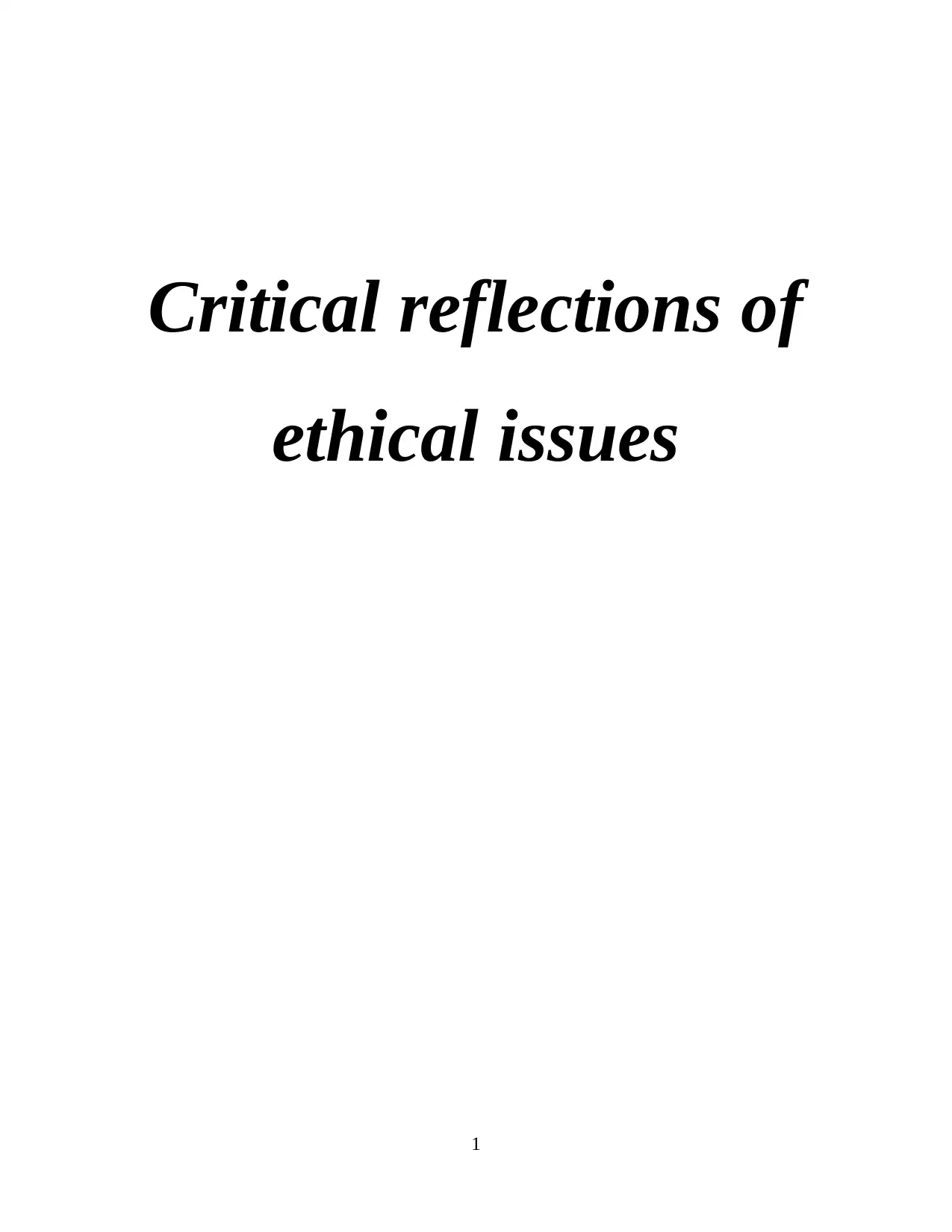
Critical reflections of
ethical issues
1
ethical issues
1
Secure Best Marks with AI Grader
Need help grading? Try our AI Grader for instant feedback on your assignments.
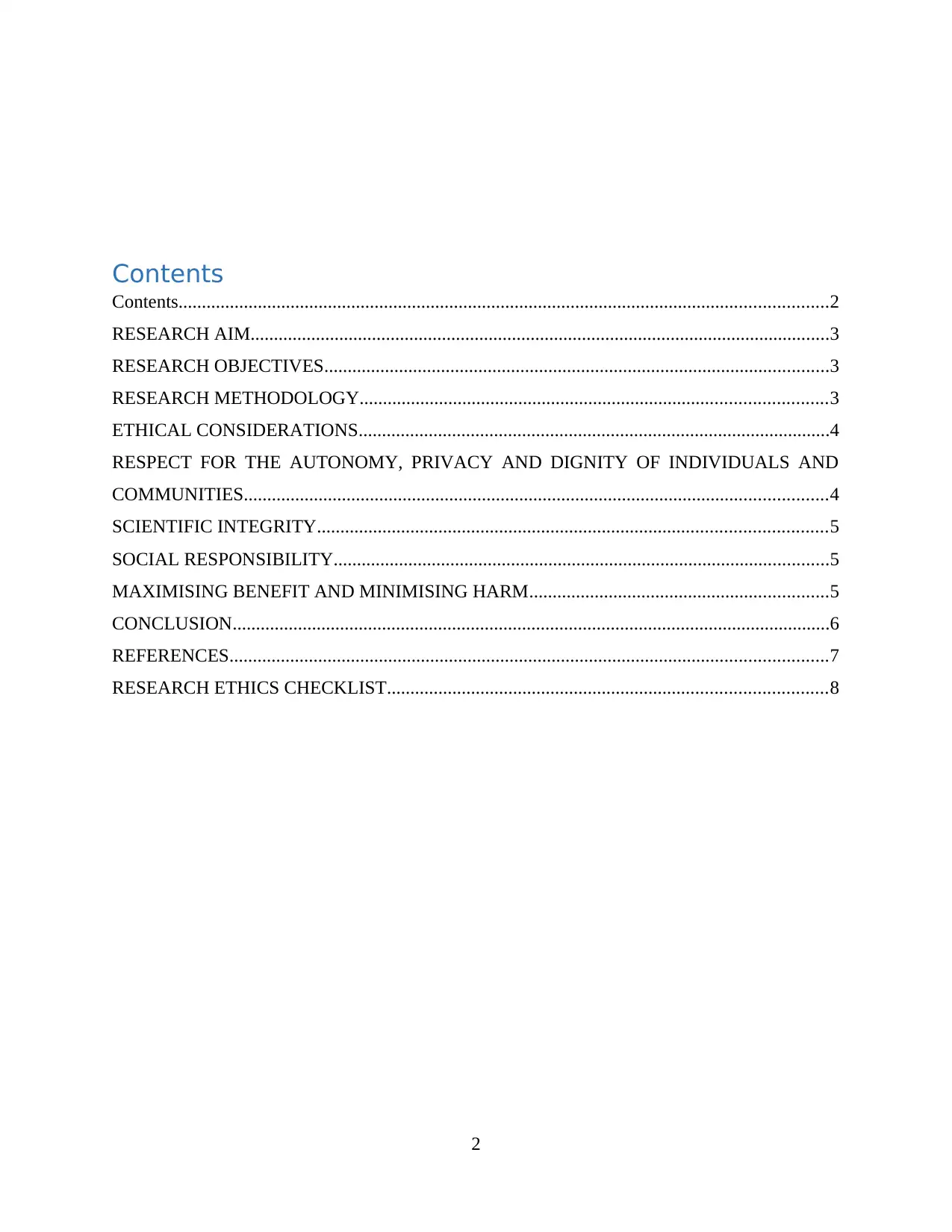
Contents
Contents...........................................................................................................................................2
RESEARCH AIM............................................................................................................................3
RESEARCH OBJECTIVES............................................................................................................3
RESEARCH METHODOLOGY....................................................................................................3
ETHICAL CONSIDERATIONS.....................................................................................................4
RESPECT FOR THE AUTONOMY, PRIVACY AND DIGNITY OF INDIVIDUALS AND
COMMUNITIES.............................................................................................................................4
SCIENTIFIC INTEGRITY.............................................................................................................5
SOCIAL RESPONSIBILITY..........................................................................................................5
MAXIMISING BENEFIT AND MINIMISING HARM................................................................5
CONCLUSION................................................................................................................................6
REFERENCES................................................................................................................................7
RESEARCH ETHICS CHECKLIST..............................................................................................8
2
Contents...........................................................................................................................................2
RESEARCH AIM............................................................................................................................3
RESEARCH OBJECTIVES............................................................................................................3
RESEARCH METHODOLOGY....................................................................................................3
ETHICAL CONSIDERATIONS.....................................................................................................4
RESPECT FOR THE AUTONOMY, PRIVACY AND DIGNITY OF INDIVIDUALS AND
COMMUNITIES.............................................................................................................................4
SCIENTIFIC INTEGRITY.............................................................................................................5
SOCIAL RESPONSIBILITY..........................................................................................................5
MAXIMISING BENEFIT AND MINIMISING HARM................................................................5
CONCLUSION................................................................................................................................6
REFERENCES................................................................................................................................7
RESEARCH ETHICS CHECKLIST..............................................................................................8
2

RESEARCH AIM
Main aim of this research is “To identify the impact of service quality in increasing
customer loyalty towards brand. A study on ASDA within grocery food retailing of UK
RESEARCH OBJECTIVES
To know the main attributes of customer loyalty towards the brand
To assess the relationship between service quality on customer loyalty
To recommended different ways for increasing customer loyalty towards grocery food
retailing of UK
RESEARCH METHODOLOGY
Research methodology is an important section of the research because it assists in collecting
of reliable information through research methodology. There are various types of research
methodologies that are useful within a research. These are explained as below:
Research approach: There are two types of research approaches i.e. inductive and deductive. In
order to analysis data about the relationship between service quality and customer loyalty in the
context of grocery food retailing in the UK, deductive approach is used by researcher. Main aim
regarding the use of deductive approach is it assists in evaluating of quantitative data easily and
within minimum time period (Zhang and et. al., 2021).
Research design: There are mainly two types of research designs including qualitative and
quantitative. According to the existing topic, quantitative research is a chosen design. Main
purpose about the use of quantitative research is it provides numerical data and analysis
information in descriptive manner as compare to qualitative research (Protić, 2021).
Research methods: There are basically two methods of data collection i.e. primary and
secondary. Within a current research, both primary and secondary research will be used for
attaining research aim and each objective in successful manner. In order to gather primary
information, questionnaire will be used by researcher because this helps in collecting of
numerical data in less time (Borgstede and Scholz, 2021). In order to collect secondary
information, there are various sources such as articles, books, magazines etc., are used for
literature review.
Research participants: There are two methods of selecting research participants i.e.
probability and non-probability. According to the present investigation, probability technique of
3
Main aim of this research is “To identify the impact of service quality in increasing
customer loyalty towards brand. A study on ASDA within grocery food retailing of UK
RESEARCH OBJECTIVES
To know the main attributes of customer loyalty towards the brand
To assess the relationship between service quality on customer loyalty
To recommended different ways for increasing customer loyalty towards grocery food
retailing of UK
RESEARCH METHODOLOGY
Research methodology is an important section of the research because it assists in collecting
of reliable information through research methodology. There are various types of research
methodologies that are useful within a research. These are explained as below:
Research approach: There are two types of research approaches i.e. inductive and deductive. In
order to analysis data about the relationship between service quality and customer loyalty in the
context of grocery food retailing in the UK, deductive approach is used by researcher. Main aim
regarding the use of deductive approach is it assists in evaluating of quantitative data easily and
within minimum time period (Zhang and et. al., 2021).
Research design: There are mainly two types of research designs including qualitative and
quantitative. According to the existing topic, quantitative research is a chosen design. Main
purpose about the use of quantitative research is it provides numerical data and analysis
information in descriptive manner as compare to qualitative research (Protić, 2021).
Research methods: There are basically two methods of data collection i.e. primary and
secondary. Within a current research, both primary and secondary research will be used for
attaining research aim and each objective in successful manner. In order to gather primary
information, questionnaire will be used by researcher because this helps in collecting of
numerical data in less time (Borgstede and Scholz, 2021). In order to collect secondary
information, there are various sources such as articles, books, magazines etc., are used for
literature review.
Research participants: There are two methods of selecting research participants i.e.
probability and non-probability. According to the present investigation, probability technique of
3
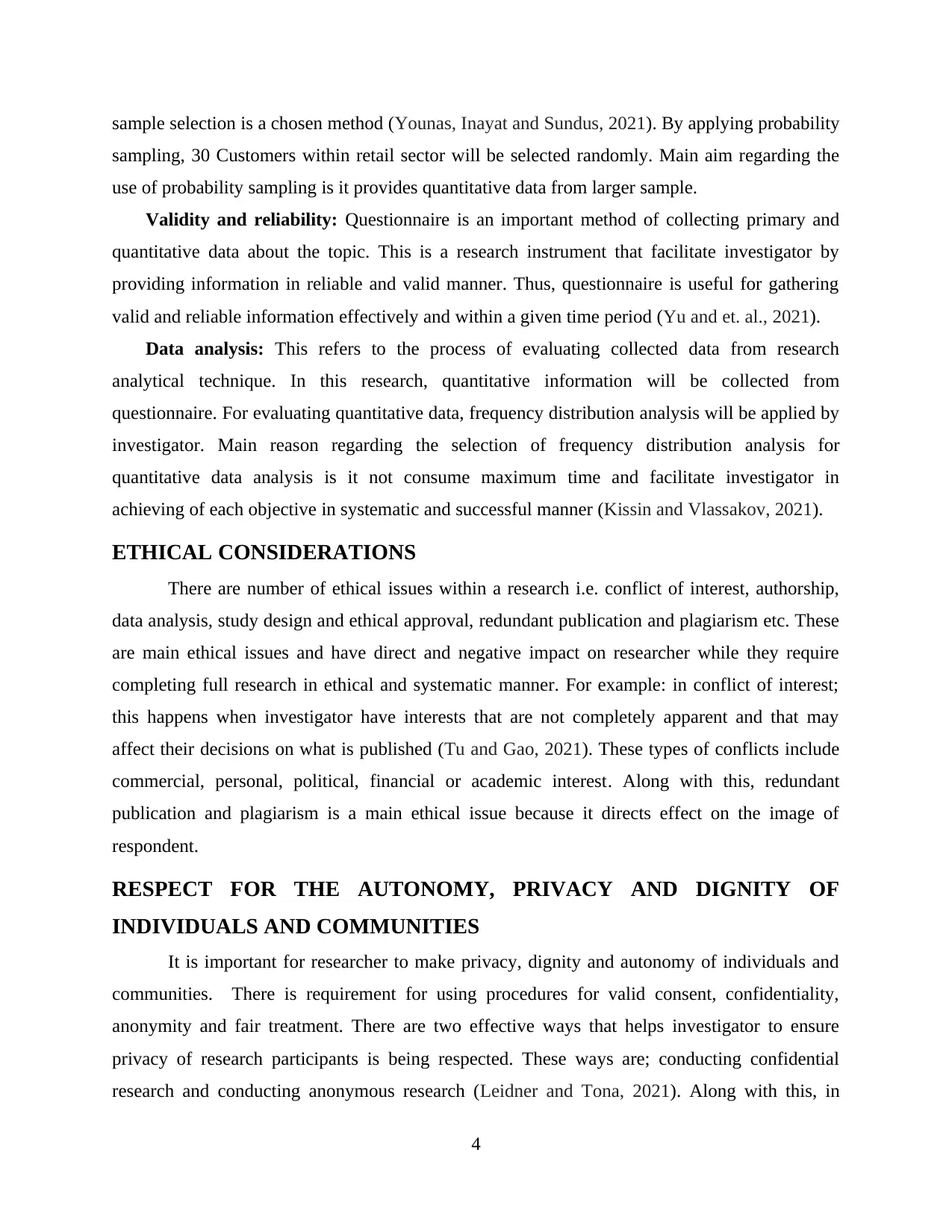
sample selection is a chosen method (Younas, Inayat and Sundus, 2021). By applying probability
sampling, 30 Customers within retail sector will be selected randomly. Main aim regarding the
use of probability sampling is it provides quantitative data from larger sample.
Validity and reliability: Questionnaire is an important method of collecting primary and
quantitative data about the topic. This is a research instrument that facilitate investigator by
providing information in reliable and valid manner. Thus, questionnaire is useful for gathering
valid and reliable information effectively and within a given time period (Yu and et. al., 2021).
Data analysis: This refers to the process of evaluating collected data from research
analytical technique. In this research, quantitative information will be collected from
questionnaire. For evaluating quantitative data, frequency distribution analysis will be applied by
investigator. Main reason regarding the selection of frequency distribution analysis for
quantitative data analysis is it not consume maximum time and facilitate investigator in
achieving of each objective in systematic and successful manner (Kissin and Vlassakov, 2021).
ETHICAL CONSIDERATIONS
There are number of ethical issues within a research i.e. conflict of interest, authorship,
data analysis, study design and ethical approval, redundant publication and plagiarism etc. These
are main ethical issues and have direct and negative impact on researcher while they require
completing full research in ethical and systematic manner. For example: in conflict of interest;
this happens when investigator have interests that are not completely apparent and that may
affect their decisions on what is published (Tu and Gao, 2021). These types of conflicts include
commercial, personal, political, financial or academic interest. Along with this, redundant
publication and plagiarism is a main ethical issue because it directs effect on the image of
respondent.
RESPECT FOR THE AUTONOMY, PRIVACY AND DIGNITY OF
INDIVIDUALS AND COMMUNITIES
It is important for researcher to make privacy, dignity and autonomy of individuals and
communities. There is requirement for using procedures for valid consent, confidentiality,
anonymity and fair treatment. There are two effective ways that helps investigator to ensure
privacy of research participants is being respected. These ways are; conducting confidential
research and conducting anonymous research (Leidner and Tona, 2021). Along with this, in
4
sampling, 30 Customers within retail sector will be selected randomly. Main aim regarding the
use of probability sampling is it provides quantitative data from larger sample.
Validity and reliability: Questionnaire is an important method of collecting primary and
quantitative data about the topic. This is a research instrument that facilitate investigator by
providing information in reliable and valid manner. Thus, questionnaire is useful for gathering
valid and reliable information effectively and within a given time period (Yu and et. al., 2021).
Data analysis: This refers to the process of evaluating collected data from research
analytical technique. In this research, quantitative information will be collected from
questionnaire. For evaluating quantitative data, frequency distribution analysis will be applied by
investigator. Main reason regarding the selection of frequency distribution analysis for
quantitative data analysis is it not consume maximum time and facilitate investigator in
achieving of each objective in systematic and successful manner (Kissin and Vlassakov, 2021).
ETHICAL CONSIDERATIONS
There are number of ethical issues within a research i.e. conflict of interest, authorship,
data analysis, study design and ethical approval, redundant publication and plagiarism etc. These
are main ethical issues and have direct and negative impact on researcher while they require
completing full research in ethical and systematic manner. For example: in conflict of interest;
this happens when investigator have interests that are not completely apparent and that may
affect their decisions on what is published (Tu and Gao, 2021). These types of conflicts include
commercial, personal, political, financial or academic interest. Along with this, redundant
publication and plagiarism is a main ethical issue because it directs effect on the image of
respondent.
RESPECT FOR THE AUTONOMY, PRIVACY AND DIGNITY OF
INDIVIDUALS AND COMMUNITIES
It is important for researcher to make privacy, dignity and autonomy of individuals and
communities. There is requirement for using procedures for valid consent, confidentiality,
anonymity and fair treatment. There are two effective ways that helps investigator to ensure
privacy of research participants is being respected. These ways are; conducting confidential
research and conducting anonymous research (Leidner and Tona, 2021). Along with this, in
4
Secure Best Marks with AI Grader
Need help grading? Try our AI Grader for instant feedback on your assignments.
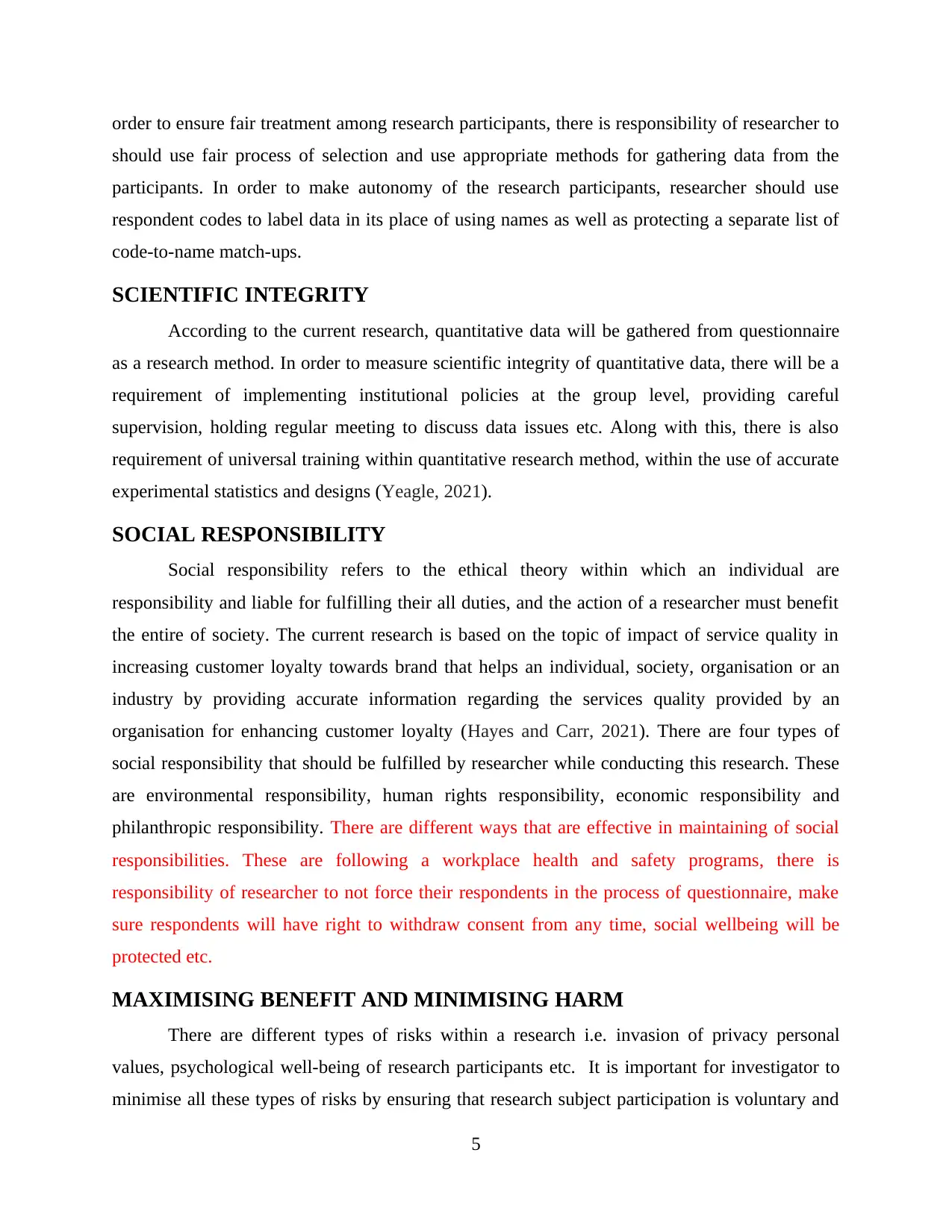
order to ensure fair treatment among research participants, there is responsibility of researcher to
should use fair process of selection and use appropriate methods for gathering data from the
participants. In order to make autonomy of the research participants, researcher should use
respondent codes to label data in its place of using names as well as protecting a separate list of
code-to-name match-ups.
SCIENTIFIC INTEGRITY
According to the current research, quantitative data will be gathered from questionnaire
as a research method. In order to measure scientific integrity of quantitative data, there will be a
requirement of implementing institutional policies at the group level, providing careful
supervision, holding regular meeting to discuss data issues etc. Along with this, there is also
requirement of universal training within quantitative research method, within the use of accurate
experimental statistics and designs (Yeagle, 2021).
SOCIAL RESPONSIBILITY
Social responsibility refers to the ethical theory within which an individual are
responsibility and liable for fulfilling their all duties, and the action of a researcher must benefit
the entire of society. The current research is based on the topic of impact of service quality in
increasing customer loyalty towards brand that helps an individual, society, organisation or an
industry by providing accurate information regarding the services quality provided by an
organisation for enhancing customer loyalty (Hayes and Carr, 2021). There are four types of
social responsibility that should be fulfilled by researcher while conducting this research. These
are environmental responsibility, human rights responsibility, economic responsibility and
philanthropic responsibility. There are different ways that are effective in maintaining of social
responsibilities. These are following a workplace health and safety programs, there is
responsibility of researcher to not force their respondents in the process of questionnaire, make
sure respondents will have right to withdraw consent from any time, social wellbeing will be
protected etc.
MAXIMISING BENEFIT AND MINIMISING HARM
There are different types of risks within a research i.e. invasion of privacy personal
values, psychological well-being of research participants etc. It is important for investigator to
minimise all these types of risks by ensuring that research subject participation is voluntary and
5
should use fair process of selection and use appropriate methods for gathering data from the
participants. In order to make autonomy of the research participants, researcher should use
respondent codes to label data in its place of using names as well as protecting a separate list of
code-to-name match-ups.
SCIENTIFIC INTEGRITY
According to the current research, quantitative data will be gathered from questionnaire
as a research method. In order to measure scientific integrity of quantitative data, there will be a
requirement of implementing institutional policies at the group level, providing careful
supervision, holding regular meeting to discuss data issues etc. Along with this, there is also
requirement of universal training within quantitative research method, within the use of accurate
experimental statistics and designs (Yeagle, 2021).
SOCIAL RESPONSIBILITY
Social responsibility refers to the ethical theory within which an individual are
responsibility and liable for fulfilling their all duties, and the action of a researcher must benefit
the entire of society. The current research is based on the topic of impact of service quality in
increasing customer loyalty towards brand that helps an individual, society, organisation or an
industry by providing accurate information regarding the services quality provided by an
organisation for enhancing customer loyalty (Hayes and Carr, 2021). There are four types of
social responsibility that should be fulfilled by researcher while conducting this research. These
are environmental responsibility, human rights responsibility, economic responsibility and
philanthropic responsibility. There are different ways that are effective in maintaining of social
responsibilities. These are following a workplace health and safety programs, there is
responsibility of researcher to not force their respondents in the process of questionnaire, make
sure respondents will have right to withdraw consent from any time, social wellbeing will be
protected etc.
MAXIMISING BENEFIT AND MINIMISING HARM
There are different types of risks within a research i.e. invasion of privacy personal
values, psychological well-being of research participants etc. It is important for investigator to
minimise all these types of risks by ensuring that research subject participation is voluntary and
5

informed, provide accurate information or data about the topic, not ask personal questions that
harm on researcher etc. By reducing all types of research will be benefited researcher in finding
of valid outcomes within minimum time (Mott and et. al., 2021).
CONCLUSION
From the above mentioned information, it has been concluded that it is important for me
as a researcher to follow all ethics within a research because it helps in completion of each
activity of the study in ethical manner. It is important to minimise the risk of harm because it
effected on participants that result in completion of full project unethically. Therefore,
maintaining dignity, integrity, confidentiality and autonomy of research participants are
necessary in completion of full project successfully and ethically.
6
harm on researcher etc. By reducing all types of research will be benefited researcher in finding
of valid outcomes within minimum time (Mott and et. al., 2021).
CONCLUSION
From the above mentioned information, it has been concluded that it is important for me
as a researcher to follow all ethics within a research because it helps in completion of each
activity of the study in ethical manner. It is important to minimise the risk of harm because it
effected on participants that result in completion of full project unethically. Therefore,
maintaining dignity, integrity, confidentiality and autonomy of research participants are
necessary in completion of full project successfully and ethically.
6

REFERENCES
Books and Journals
Borgstede, M. and Scholz, M., 2021. Quantitative and Qualitative Approaches to Generalization
and Replication–A Representationalist View. Frontiers in Psychology, 12.
Hayes, R. A. and Carr, C. T., 2021. Getting called out: Effects of feedback to social media
corporate social responsibility statements. Public Relations Review, 47(1), p.101962.
Kissin, I. and Vlassakov, K.V., 2021. Pharmacology of General Anesthetics: Quantitative
History of Research Attractiveness. Anesthesia & Analgesia. 132(5). pp.1486-1488.
Leidner, D.E. and Tona, O., 2021. The CARE theory of dignity amid personal data
digitalization. MIS Quarterly. 45(1). pp.343-370.
Mott, N. and et. al., 2021. Medical Maximizing–Minimizing Preferences in Relation to Low-
Value Services for Older Women with Hormone Receptor-Positive Breast Cancer: A
Qualitative Study. Annals of Surgical Oncology. 28(2). pp.941-949.
Protić, S., 2021. Quantitative Research in Social Trauma. In Social Trauma–An Interdisciplinary
Textbook (pp. 327-334). Springer, Cham.
Tu, J. and Gao, W., 2021. Ethical Considerations of Wearable Technologies in Human
Research. Advanced Healthcare Materials, p.2100127.
Yeagle, P., 2021. Scientific integrity at Science Advances: Essential pillar supporting scientific
progress.
Younas, A., Inayat, S. and Sundus, A., 2021. Joint displays for qualitative-quantitative synthesis
in mixed methods reviews. Research Methods in Medicine & Health Sciences,
p.2632084320984374.
Yu, R. and et. al., 2021. Optimal Matching for Observational Studies that Integrate Quantitative
and Qualitative Research. Statistics and Public Policy, (just-accepted), pp.1-30.
Zhang, Y. and et. al., 2021. Quantitative research on the efficiency of ancient information
transmission system: A case study of Wenzhou in the Ming Dynasty. Plos one. 16(4).
p.e0250622.
7
Books and Journals
Borgstede, M. and Scholz, M., 2021. Quantitative and Qualitative Approaches to Generalization
and Replication–A Representationalist View. Frontiers in Psychology, 12.
Hayes, R. A. and Carr, C. T., 2021. Getting called out: Effects of feedback to social media
corporate social responsibility statements. Public Relations Review, 47(1), p.101962.
Kissin, I. and Vlassakov, K.V., 2021. Pharmacology of General Anesthetics: Quantitative
History of Research Attractiveness. Anesthesia & Analgesia. 132(5). pp.1486-1488.
Leidner, D.E. and Tona, O., 2021. The CARE theory of dignity amid personal data
digitalization. MIS Quarterly. 45(1). pp.343-370.
Mott, N. and et. al., 2021. Medical Maximizing–Minimizing Preferences in Relation to Low-
Value Services for Older Women with Hormone Receptor-Positive Breast Cancer: A
Qualitative Study. Annals of Surgical Oncology. 28(2). pp.941-949.
Protić, S., 2021. Quantitative Research in Social Trauma. In Social Trauma–An Interdisciplinary
Textbook (pp. 327-334). Springer, Cham.
Tu, J. and Gao, W., 2021. Ethical Considerations of Wearable Technologies in Human
Research. Advanced Healthcare Materials, p.2100127.
Yeagle, P., 2021. Scientific integrity at Science Advances: Essential pillar supporting scientific
progress.
Younas, A., Inayat, S. and Sundus, A., 2021. Joint displays for qualitative-quantitative synthesis
in mixed methods reviews. Research Methods in Medicine & Health Sciences,
p.2632084320984374.
Yu, R. and et. al., 2021. Optimal Matching for Observational Studies that Integrate Quantitative
and Qualitative Research. Statistics and Public Policy, (just-accepted), pp.1-30.
Zhang, Y. and et. al., 2021. Quantitative research on the efficiency of ancient information
transmission system: A case study of Wenzhou in the Ming Dynasty. Plos one. 16(4).
p.e0250622.
7
Paraphrase This Document
Need a fresh take? Get an instant paraphrase of this document with our AI Paraphraser
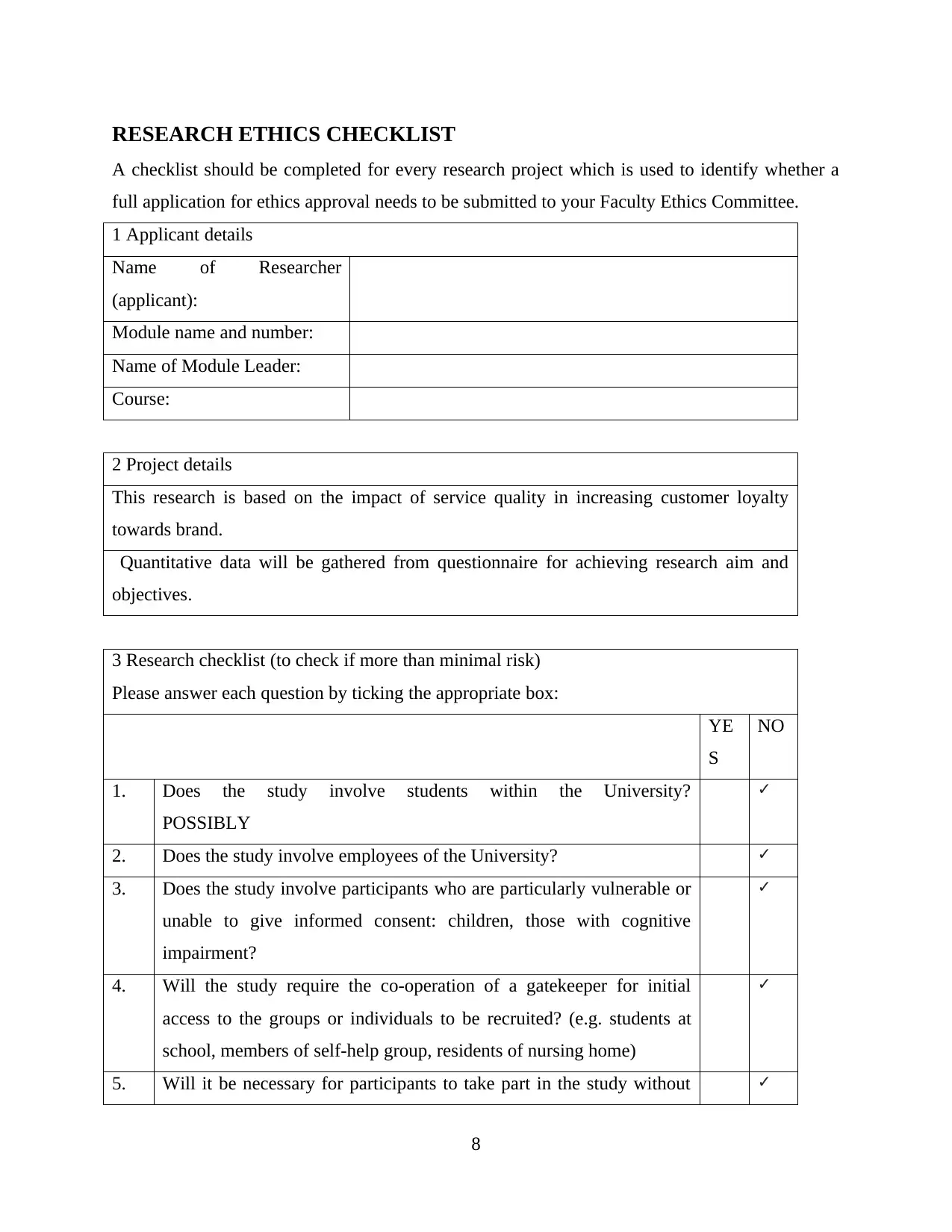
RESEARCH ETHICS CHECKLIST
A checklist should be completed for every research project which is used to identify whether a
full application for ethics approval needs to be submitted to your Faculty Ethics Committee.
1 Applicant details
Name of Researcher
(applicant):
Module name and number:
Name of Module Leader:
Course:
2 Project details
This research is based on the impact of service quality in increasing customer loyalty
towards brand.
Quantitative data will be gathered from questionnaire for achieving research aim and
objectives.
3 Research checklist (to check if more than minimal risk)
Please answer each question by ticking the appropriate box:
YE
S
NO
1. Does the study involve students within the University?
POSSIBLY
✓
2. Does the study involve employees of the University? ✓
3. Does the study involve participants who are particularly vulnerable or
unable to give informed consent: children, those with cognitive
impairment?
✓
4. Will the study require the co-operation of a gatekeeper for initial
access to the groups or individuals to be recruited? (e.g. students at
school, members of self-help group, residents of nursing home)
✓
5. Will it be necessary for participants to take part in the study without ✓
8
A checklist should be completed for every research project which is used to identify whether a
full application for ethics approval needs to be submitted to your Faculty Ethics Committee.
1 Applicant details
Name of Researcher
(applicant):
Module name and number:
Name of Module Leader:
Course:
2 Project details
This research is based on the impact of service quality in increasing customer loyalty
towards brand.
Quantitative data will be gathered from questionnaire for achieving research aim and
objectives.
3 Research checklist (to check if more than minimal risk)
Please answer each question by ticking the appropriate box:
YE
S
NO
1. Does the study involve students within the University?
POSSIBLY
✓
2. Does the study involve employees of the University? ✓
3. Does the study involve participants who are particularly vulnerable or
unable to give informed consent: children, those with cognitive
impairment?
✓
4. Will the study require the co-operation of a gatekeeper for initial
access to the groups or individuals to be recruited? (e.g. students at
school, members of self-help group, residents of nursing home)
✓
5. Will it be necessary for participants to take part in the study without ✓
8
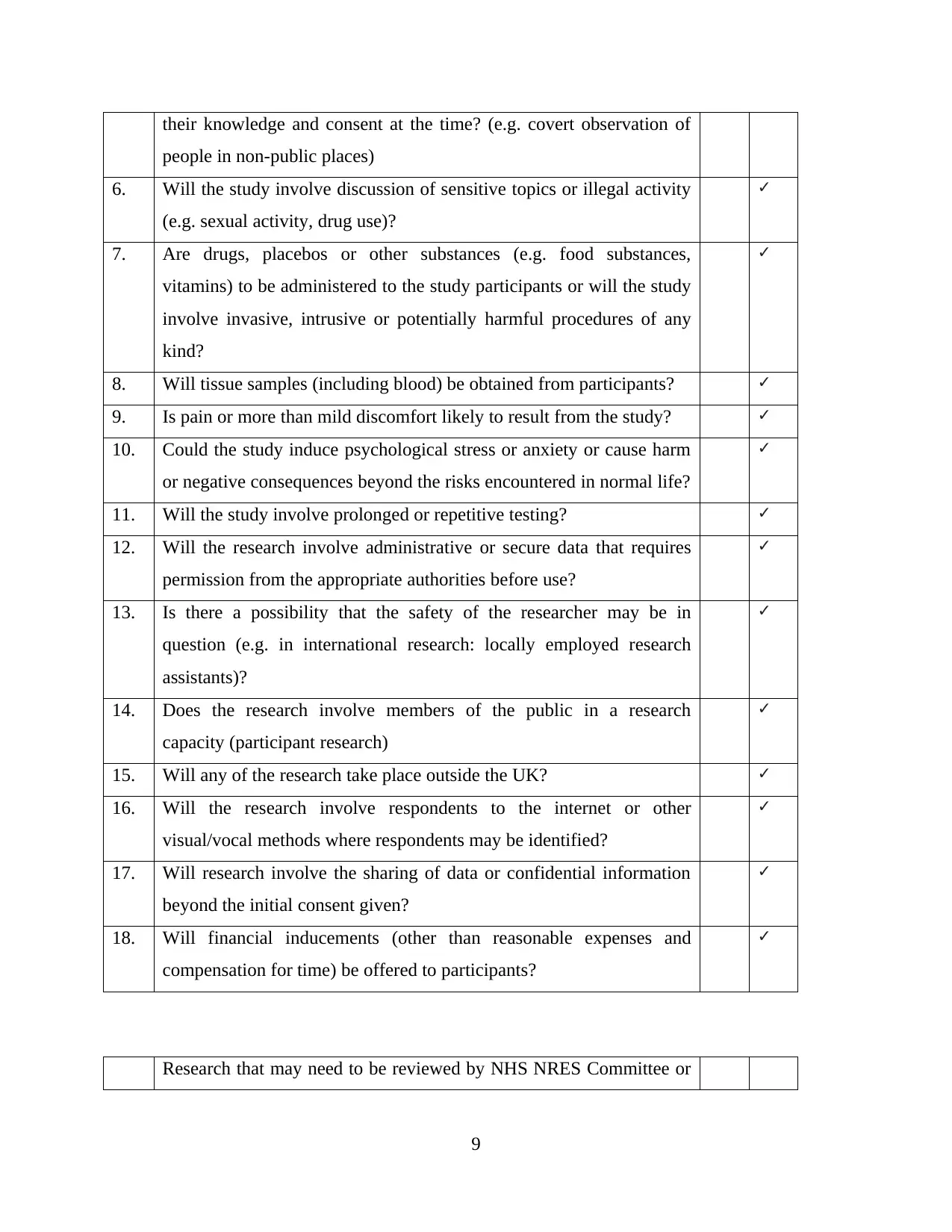
their knowledge and consent at the time? (e.g. covert observation of
people in non-public places)
6. Will the study involve discussion of sensitive topics or illegal activity
(e.g. sexual activity, drug use)?
✓
7. Are drugs, placebos or other substances (e.g. food substances,
vitamins) to be administered to the study participants or will the study
involve invasive, intrusive or potentially harmful procedures of any
kind?
✓
8. Will tissue samples (including blood) be obtained from participants? ✓
9. Is pain or more than mild discomfort likely to result from the study? ✓
10. Could the study induce psychological stress or anxiety or cause harm
or negative consequences beyond the risks encountered in normal life?
✓
11. Will the study involve prolonged or repetitive testing? ✓
12. Will the research involve administrative or secure data that requires
permission from the appropriate authorities before use?
✓
13. Is there a possibility that the safety of the researcher may be in
question (e.g. in international research: locally employed research
assistants)?
✓
14. Does the research involve members of the public in a research
capacity (participant research)
✓
15. Will any of the research take place outside the UK? ✓
16. Will the research involve respondents to the internet or other
visual/vocal methods where respondents may be identified?
✓
17. Will research involve the sharing of data or confidential information
beyond the initial consent given?
✓
18. Will financial inducements (other than reasonable expenses and
compensation for time) be offered to participants?
✓
Research that may need to be reviewed by NHS NRES Committee or
9
people in non-public places)
6. Will the study involve discussion of sensitive topics or illegal activity
(e.g. sexual activity, drug use)?
✓
7. Are drugs, placebos or other substances (e.g. food substances,
vitamins) to be administered to the study participants or will the study
involve invasive, intrusive or potentially harmful procedures of any
kind?
✓
8. Will tissue samples (including blood) be obtained from participants? ✓
9. Is pain or more than mild discomfort likely to result from the study? ✓
10. Could the study induce psychological stress or anxiety or cause harm
or negative consequences beyond the risks encountered in normal life?
✓
11. Will the study involve prolonged or repetitive testing? ✓
12. Will the research involve administrative or secure data that requires
permission from the appropriate authorities before use?
✓
13. Is there a possibility that the safety of the researcher may be in
question (e.g. in international research: locally employed research
assistants)?
✓
14. Does the research involve members of the public in a research
capacity (participant research)
✓
15. Will any of the research take place outside the UK? ✓
16. Will the research involve respondents to the internet or other
visual/vocal methods where respondents may be identified?
✓
17. Will research involve the sharing of data or confidential information
beyond the initial consent given?
✓
18. Will financial inducements (other than reasonable expenses and
compensation for time) be offered to participants?
✓
Research that may need to be reviewed by NHS NRES Committee or
9
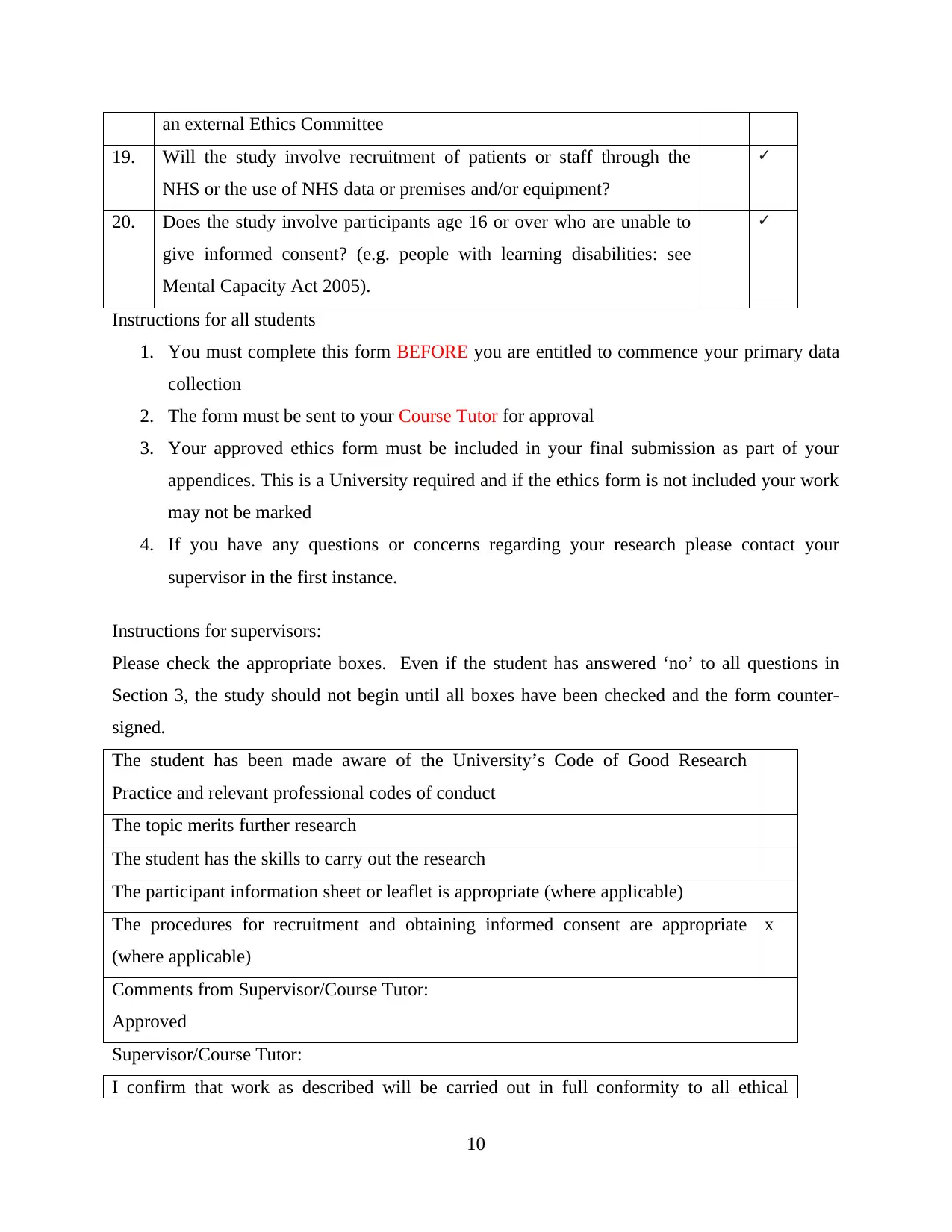
an external Ethics Committee
19. Will the study involve recruitment of patients or staff through the
NHS or the use of NHS data or premises and/or equipment?
✓
20. Does the study involve participants age 16 or over who are unable to
give informed consent? (e.g. people with learning disabilities: see
Mental Capacity Act 2005).
✓
Instructions for all students
1. You must complete this form BEFORE you are entitled to commence your primary data
collection
2. The form must be sent to your Course Tutor for approval
3. Your approved ethics form must be included in your final submission as part of your
appendices. This is a University required and if the ethics form is not included your work
may not be marked
4. If you have any questions or concerns regarding your research please contact your
supervisor in the first instance.
Instructions for supervisors:
Please check the appropriate boxes. Even if the student has answered ‘no’ to all questions in
Section 3, the study should not begin until all boxes have been checked and the form counter-
signed.
The student has been made aware of the University’s Code of Good Research
Practice and relevant professional codes of conduct
The topic merits further research
The student has the skills to carry out the research
The participant information sheet or leaflet is appropriate (where applicable)
The procedures for recruitment and obtaining informed consent are appropriate
(where applicable)
x
Comments from Supervisor/Course Tutor:
Approved
Supervisor/Course Tutor:
I confirm that work as described will be carried out in full conformity to all ethical
10
19. Will the study involve recruitment of patients or staff through the
NHS or the use of NHS data or premises and/or equipment?
✓
20. Does the study involve participants age 16 or over who are unable to
give informed consent? (e.g. people with learning disabilities: see
Mental Capacity Act 2005).
✓
Instructions for all students
1. You must complete this form BEFORE you are entitled to commence your primary data
collection
2. The form must be sent to your Course Tutor for approval
3. Your approved ethics form must be included in your final submission as part of your
appendices. This is a University required and if the ethics form is not included your work
may not be marked
4. If you have any questions or concerns regarding your research please contact your
supervisor in the first instance.
Instructions for supervisors:
Please check the appropriate boxes. Even if the student has answered ‘no’ to all questions in
Section 3, the study should not begin until all boxes have been checked and the form counter-
signed.
The student has been made aware of the University’s Code of Good Research
Practice and relevant professional codes of conduct
The topic merits further research
The student has the skills to carry out the research
The participant information sheet or leaflet is appropriate (where applicable)
The procedures for recruitment and obtaining informed consent are appropriate
(where applicable)
x
Comments from Supervisor/Course Tutor:
Approved
Supervisor/Course Tutor:
I confirm that work as described will be carried out in full conformity to all ethical
10
Secure Best Marks with AI Grader
Need help grading? Try our AI Grader for instant feedback on your assignments.

standards and any additional professional requirements.
Name (please print):
Signed:
Date:
11
Name (please print):
Signed:
Date:
11
1 out of 11
Related Documents
Your All-in-One AI-Powered Toolkit for Academic Success.
+13062052269
info@desklib.com
Available 24*7 on WhatsApp / Email
![[object Object]](/_next/static/media/star-bottom.7253800d.svg)
Unlock your academic potential
© 2024 | Zucol Services PVT LTD | All rights reserved.





